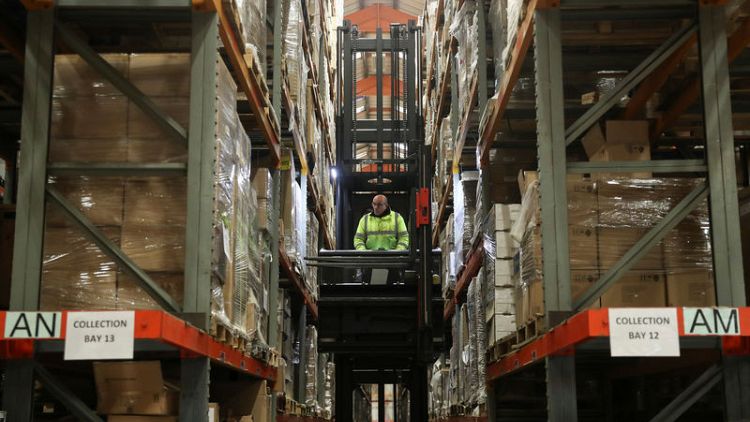By Andy Bruce
LONDON (Reuters) - A renewed rush to stockpile ahead of another aborted Brexit deadline limited losses for British manufacturers last month, though not by enough to prevent a sixth month of contraction, a survey showed on Friday.
The IHS Markit/CIPS UK Manufacturing Purchasing Managers' Index (PMI) rose to 49.6 from 48.3 in September, its highest level since April and topping all forecasts in a Reuters poll of economists that had pointed to a reading of 48.1.
However, the index still remained below the 50 dividing line between growth and contraction.
October's PMI was flattered by manufacturers building stocks ahead of the Oct. 31 date for Brexit that was superseded this week by a Jan. 31 deadline, survey compiler IHS Markit said.
Britain will also hold an early national election on Dec. 12 as Prime Minister Boris Johnson tries to break the Brexit deadlock.
Uncertainty around Britain's exit from the European Union, originally scheduled for March 29, had previously prompted factories to load up on parts at the fastest rate in the 27-year history of the PMI surveys in early 2019.
That spurred a brief increase in manufacturing output which gave way to a sharp downturn in mid-2019, exacerbated by a slowing global economy.
The latest official figures show that factory output fell by 1.7% in the year to August, and the Confederation of British Industry said last week that manufacturers reported the bleakest outlook since 2009.
October's PMI data showed that new business continued to decline, despite the fastest growth in export orders since December 2018 as EU customers stocked up on parts from British suppliers - a sign that domestic demand was especially weak.
"The underlying picture looks even darker than even these disappointing headline numbers suggest," IHS Markit director Rob Dobson said.
"Output and new orders fell despite short-term boosts from stock-building activity in advance of the October 31 Brexit deadline, which included a rise in exports as clients in the EU sought to mitigate supply risk."
Compared with its long-term average, the elevated level of the stocks of purchases index added 0.8 points to the headline PMI.
IHS Markit said Brexit uncertainty had hurt the investment goods industry hardest as customers postpone or cancel capital spending.
"With a further Brexit extension confirmed and the prospect of a December general election, it looks as if the spectre of uncertainty will cast its shadow over manufacturing for the remainder of 2019," Dobson said.
(Reporting by David Milliken; Editing by Catherine Evans)



